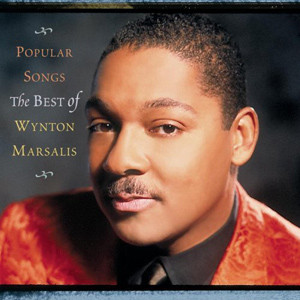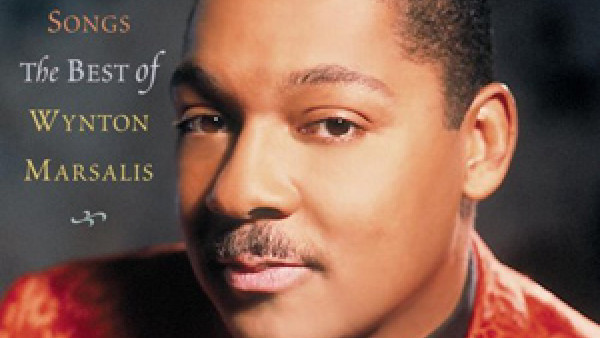For immediate release - Popular Songs: The Best of Wynton Marsalis
FETES 20th ANNIVERSARY OF HIS FIRST COLUMBIA RECORDINGS AND UPCOMING 40th BIRTHDAY
The first ‘Best Of’ compilation of his career — with over 73 minutes of originals and standards spanning 1987 to 1999 — is set for June 26th in-store date on Columbia/Legacy
“The most important thing about Marsalis is that he truly loves to communicate the essences of music to his fellow musicians and to his audiences. In his dream world, the ideal is that good old hometown feeling that he drew from the best of his New Orleans background. That dream world inhabits the meaning of his art.”
— from the liner notes written by Stanley Crouch
As the 20th anniversary approaches of the first recordings made by Wynton Marsalis as a Columbia artist in the summer 1981, followed by his 40th birthday celebration on October 18, 1961, the timing is appropriate for POPULAR SONGS: THE BEST OF WYNTON MARSALIS. This marks the first time in the 9-time Grammy winning artist’s career that any collection of his Columbia recordings has ever been compiled and released in this country. Comprised of 12 full-length tracks from albums released between 1985 and 1999, and clocking in with more than 73 minutes of music, this historic collection has been scheduled for July 31st in-store date on Columbia/Legacy Jazz, a division of Sony Music.
POPULAR SONGS focuses primarily on Marsalis’ prodigious body of original compositions. These range in time from “Black Codes” from 1985’s Black Codes (From The Underground) through “Sunflowers” from 1999’s The Marciac Suite. The latter is the 10-minute closing track from The Marciac Suite, originally composed by Marsalis for the annual Marciac Jazz Festival in southwestern France, where he has visited every August for a decade to perform and teach a class of young musicians who have grown up under his tutelage. Marsalis’ 1991 trilogy of albums, Soul Gestures In Southern Blue, are the source for “Jig’s Jig” (from Levee Low Moan) and “ Down Home With Homey” (from Uptown Ruler). His ongoing series of Standard Time albums (six volumes to date) are the source for “Soon All Will Know” (from 1987).
The only exceptions to this rich program of original works are three consecutive tracks on POPULAR SONGS that span more than a decade and are all drawn from the Standard Time series: “I Got Lost In Her Arms” (by Irving Berlin, recorded by Marsalis in 1997), “Where Or When” (by Rodgers & Hart, from 1989), and Ray Noble’s “Cherokee” (from 1986).
The tracks on POPULAR SONGS were originally produced by Steve Epstein or Delfeayo Marsalis, with the exception of “Double Rondo On the River (Pedro’s Getaway)” from 1990’s Tune In Tomorrow, which was produced by both. The new collection was produced for reissue by Nedra Olds-Neal, and mastered by Joe Palmaccio at Sony Music Studios in New York.
“Those who saw the monumental Ken Burns PBS film called JAZZ will not easily forget how effective Marsalis was as a narrator,” writes Crouch. “He knew the music, he understood the folklore, he could illustrate with his horn the differences in certain styles and what certain musicians brought to the art. He spoke of Louis Armstrong having a light in his tone, an illumination in the sound that came from his trumpet… one could easily see that [Marsalis], too, has a light in his being… one that has surely influenced an era and has proven that all of the knowledge from previous eras was neither developed nor learned nor passed on in vain.” [Video clip: “Wynton talks about Ken Burns Jazz”; full Ken Burns JAZZ site.]
Born and raised in New Orleans, Wynton Marsalis’ life story has become a familiar one by now. Son of the widely respected musician, composer and educator Ellis Marsalis, young Wynton received early experience in marching bands, jazz bands, funk bands, and orchestras with European repertoires. He was given his first trumpet at age six by Al Hirt (Ellis’ employer at the time) but didn’t take the instrument seriously until his classical studies began at age twelve. He played first trumpet in the New Orleans Civic Orchestra throughout high school, was accepted into the Berkshire Music Center at Tanglewood at seventeen, and began attending Julliard a year later.
He performed as a pit musician in Broadway’s Sweeney Todd and played with the Brooklyn Philharmonia. In the summer 1980, he joined Art Blakey and the Jazz Messengers, where he impressed jazz aficionados with his mastery of influences — Louis Armstrong, Fats Navarro, Clifford Brown, Freddie Hubbard, and especially Miles Davis. Signed to Columbia Records, Wynton took a leave from Blakey in the summer 1981 to tour with fellow Columbia artist Herbie Hancock’s Quartet (featuring the V.S.O.P. rhythm section of Ron Carter and Tony Williams). Wynton’s first recordings for the label were made in July at the CBS SONY Studios in Tokyo (in digital format) while on tour there, and were later released as Hancock’s simply-titled double-LP Quartet.
Recording continued at CBS Studios in New York with Wynton’s soon-to-be regular group including his brother Branford on saxophones, pianist Kenny Kirkland and drummer Jeff ‘Tain’ Watts. Numbers by both combos from the Tokyo and New York sessions were featured on Wynton Marsalis, the self-titled debut album. Released in January, 1982, it won numerous “Jazz LP of the Year” honors (down beat, Stereo Review, etc.) and was nominated for a Grammy.
At the 1983 Grammy Awards a year later, Wynton made history as the first artist to win back-to-back awards in the fields of Jazz (“Best Soloist” for Think Of One, his self-produced second LP) and Classical music (“Best Soloist with Orchestra “ for Haydn/Hummel/L. Mozart Trumpet Concertos). He repeated this feat the following year — setting a precedent that stands to this date — winning the same two awards in Jazz (for Hot House Flowers, his third jazz album as a leader) and Classical (for Handel, Purcell, Torelli, Fasch, Molter, his second Masterworks album, a program of baroque trumpet works).
At the 1986 ceremonies, Wynton became the youngest musician in Grammy history to win the “Best Soloist” Jazz award over three consecutive years, as Black Codes (From the Underground), his fourth Columbia LP, captured both “Soloist” and “Group” categories. Wynton took home his 7th Jazz Instrumental Grammy award (“Group”) the following year, for J Mood. He won the same award a year later for Marsalis Standard Time – Volume 1. Thus, Wynton became the only artist in history to win jazz Grammys five years running. This would be his last Grammy award until last year, when Wynton, Graham Greene and Kate Winslet shared the honor for “Best Spoken World Album For Children” for Listen To the Storyteller (Sony Classical).
Nevertheless, countless other awards and achievements followed over the next decade (and numerous Grammy nominations), as Wynton became the figurehead of the “Young Lions” movement that continues to dominate the Traditional Jazz charts today. Among the musicians whose names are associated with the doors opened by Wynton, Branford, Delfeayo, and Ellis Marsalis can be broadly counted Joshua Bell, Terence Blanchard, James Carter, Cyrus Chestnut, Steve Coleman, Kevin Eubanks, Roy Hargrove, the Harper Brothers, Donald Harrison, Antonio Hart, Kent Jordan, Marlon Jordan, Greg Osby, Nicholas Payton, Marcus Roberts, Michael White, and others.
In the second half of 1999, Wynton embarked on an ambitious release campaign, “Swinging Into the 21st” with a series of four Columbia Jazz albums (Marsalis Plays Monk — Standard Time Vol. 4, Mr. Jelly Lord — Standard Time Vol. 6, Big Train, and The Marciac Suite) and four Sony Classical albums (A Fiddler’s Tale, At the Octoroon Balls, Sweet Release & Ghost Story, and Reel Time). This 8-CD output was underscored by the long-awaited 7-CD box-set, Wynton Marsalis Septet Live At the Village Vanguard, recorded at the New York jazz mecca over seven nights spanning 1990, 1991, 1993, and 1994.
“Marsalis has had to master many different jazz languages,” Crouch notes. “He has investigated his New Orleans roots, the music of Duke Ellington, of Coleman Hawkins, of Count Basie and Lester Young, of Charlie Parker and Dizzy Gillespie, of Thelonious Monk, of Miles Davis, of Ornette Coleman, of John Coltrane and many, many others… For all of that, as this compilation proves, Marsalis has always been a very fiery player himself, a musician for whom feeling is the number one issue.”
1. Jig’s Jig
(recorded 1988, from album: Levee Low Moan, released 1991)
2. Root Groove
(recorded 1995, from album: Jump Start The Mastery of Melancholy, released 1997)
3. I Got Lost In Her Arms
(recorded 1997, from the album: The Midnight Blues, Standard Time Vol. 5, released 1998)
4. Where Or When
(recorded 1989, from the album: The Resolution Of Romance, released 1990)
5. Cherokee
(recorded 1986, from the album: Marsalis Standard Time Vol. 1, released 1987)
6. Black Codes
(recorded 1985, from the album Black Codes (From The Underground), released 1985)
7. Double Rondo On the River (Pedro’s Getaway)
(recorded 1990, from the album: Tune in Tomorrow, released 1990)
8. Down Home With Homey
(recorded 1988, from the album: Uptown Ruler, Soul Gestures in Southern Blue Vol.2, released 1991)
9. Sunflowers
(recorded 1999, from the albun: The Marciac Suite, released 1999)
10. Invitation
(recorded 1993, from the album: In This House On This Morning, released 1994)
11. The End of a Love Affair
(recorded 1987-1990, from the album: Marsalis Standard Time Vol. 2 – Intimacy Calling, released 1991)
12. Soon All Will Know
(recorded 1986, from the album: Marsalis Standard Time Vol. 1, released 1987)


